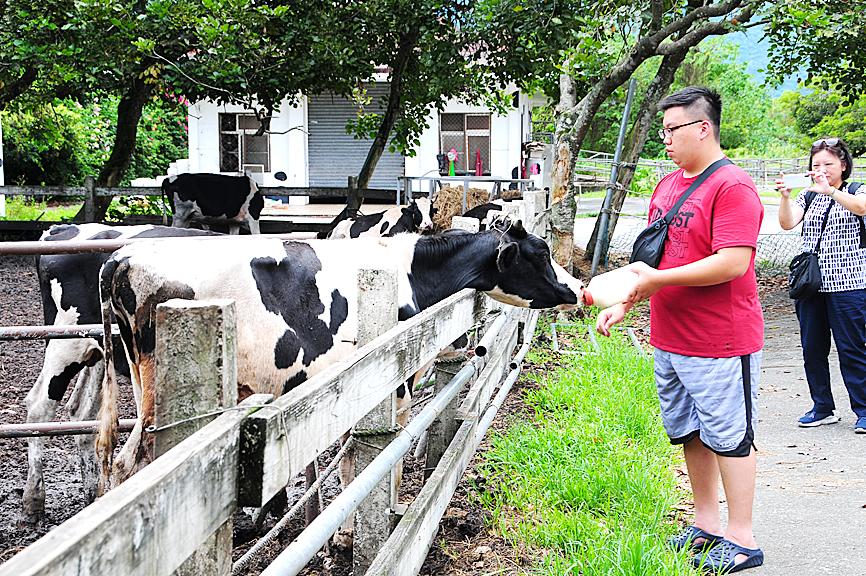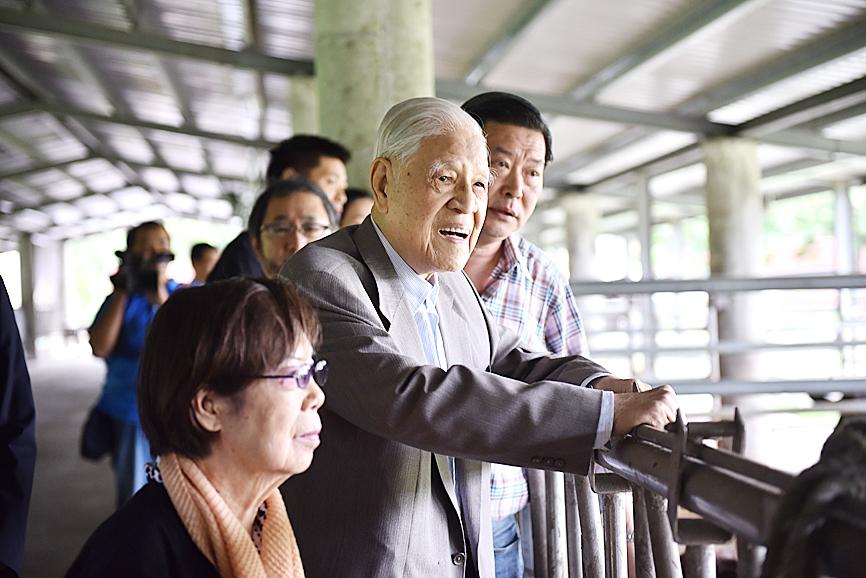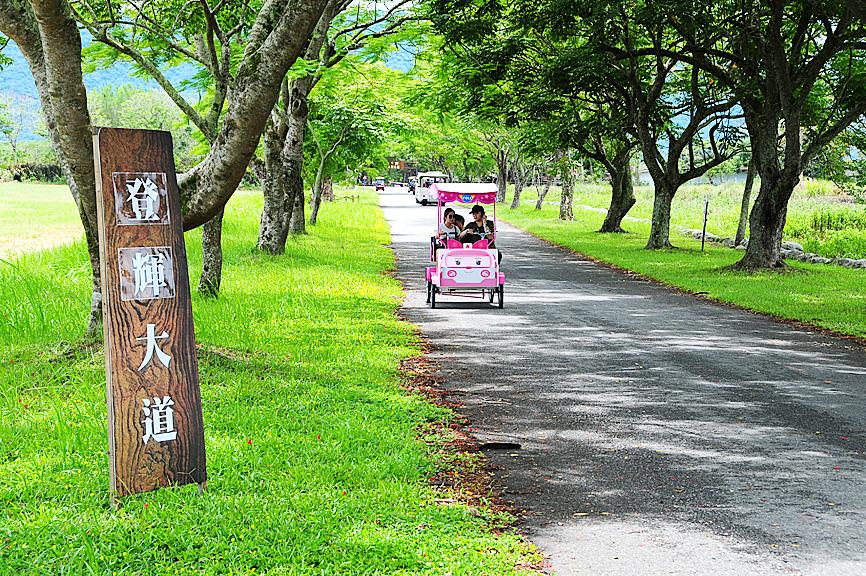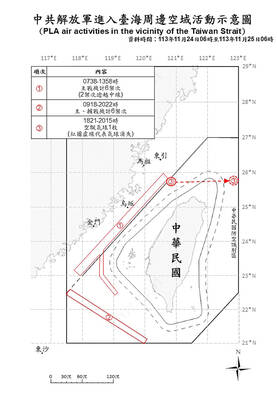Late president Lee Teng-hui (李登輝) fulfilled many political wishes during his lifetime, not least of which was securing democracy for Taiwan, but one remained — transforming the nation’s beef industry.
Lee hoped to achieve this by developing a Taiwanese breed of cattle that was better than Japanese breeds, known for their prime quality meat.
In 2016, Lee, who held a doctorate in agricultural economics from Cornell University, purchased 19 heads of cattle which had been put out to pasture on the Qingtiangang (擎天崗) grassland of Yangmingshan National Park in Taipei.

Photo: Hua Meng-ching, Taipei Times
The cattle were later verified as an ancestor breed of Tajima, a native Japanese breed brought to Taiwan during World War II.
They were transported to a dairy farm in Hualien County, with clean air and vast grassland, which Lee selected to fulfill his retirement “dream” of breeding Taiwanese prime beef cattle, the Lee Teng-hui Foundation said.
At the farm, Lee carried out his ambitious plan of developing a breed he called Yuansing (源興), using molecular breeding technologies, former Council of Agriculture (COA) minister Chen Bao-ji (陳保基) said.

Photo: Hua Meng-ching, Taipei Times
Chen said that Lee had great hopes for Taiwan’s beef industry.
Working with Taiwanese universities and professionals in Japan, Lee’s team used advanced technologies to test the quality of the cattle and analyze their DNA, while breeding cattle adapted to the local climate, Chen said.
Lee did not just want to breed Taiwan-exclusive prime beef cattle, he wanted to “thoroughly transform Taiwan’s beef industry,” Chen said.

Photo: Hua Meng-ching, Taipei Times
Yu Mei-yun (游美雲), a manager at Harvest Ranch in Hualien’s Fenglin Township (鳳林), said that Lee’s breeding project had been a top secret kept by a professional team.
In the past few months, no dairy farm employees have been permitted to enter the cowsheds housing the Yuansing because of the COVID-19 pandemic, she said.
However, Lee’s team helped nurse 300 milk cows at the farm, raising their output, which in turn made a fortune for the farm, Yu said.
Since 2016, Lee, despite being in his 90s, visited the farm every year for three consecutive years, she said, adding that he carefully inspected every breeding detail in person, she added.
Lee had planned a visit again early this year, but it was canceled after he fell ill, Yu said.
In honor of Lee, Harvest Ranch on Friday changed the name of its main road — near the ranch’s largest patch of grassland — to “Teng-hui Boulevard” (登輝大道).
Chen praised Lee’s efforts to transform the nation’s agricultural sector, pushing the traditional agricultural industries to use modern farming technologies.
In 1997 — when the pork industry was hit by foot-and-mouth disease, resulting in the mass slaughter of hogs — the predecessor to the COA, with Lee’s support, encouraged small hog farms near water conservation areas to withdraw from the industry, Chen said.
The policy was aimed at reducing water pollution caused by pig farming, while bringing technology to improve the bigger farms, Chen said.
While governor of the then-Taiwan Provincial Government, from 1981 to 1984, Lee initiated a policy to cultivate 80,000 professional farmers to produce enough crops to support the nation’s rural economy, former COA official and Tainan deputy mayor Hsu Han-chin (許漢卿) said.
Many follow-up measures, including promoting Taiwan to join the General Agreement on Tariffs and Trade and the WTO, helped Taiwan’s agriculture industry connect with international markets, he added.
Many residents of Luye Township (鹿野), in agriculture-dominated Taitung County, remembered Lee as the “parent of rural villages,” who revived a local tea-producing village in the area, former Luye Farmers’ Association executive Pan Yun-feng (潘永豐) said.
On April 9, 1982, Lee visited Yongan Village (永安), which grew oolung tea. Several days later, he named the locally produced tea “fulu tea” (福鹿茶), which made it famous, Pan said.
At peak production, 80 percent of Yongan villagers were involved in growing and producing tea, with children picking tea stems to earn pocket money, women picking tea leaves in gardens and men producing tea, Pan said.
“The crop has become prosperous,” Pan added.
The tea industry continues to flourish in the Luye area with new products, including the so-called “red oolong” developed in 2007, Pan said.
Recalling that Lee had visited the Luye tea-growing area six times, with the last visit in 2014, Pan said the former president asked for fulu Tea every time he stayed at a local hotel.
Lee had even planted a tree at the hotel and named it “Taiwan Everlasting Tree.”
“He always thought about the farmers,” Pan said.

A decision to describe a Chinese Ministry of Foreign Affairs statement on Singapore’s Taiwan policy as “erroneous” was made because the city-state has its own “one China policy” and has not followed Beijing’s “one China principle,” Deputy Minister of Foreign Affairs Tien Chung-kwang (田中光) said yesterday. It has been a longstanding practice for the People’s Republic of China (PRC) to speak on other countries’ behalf concerning Taiwan, Tien said. The latest example was a statement issued by the PRC after a meeting between Singaporean Prime Minister Lawrence Wong (黃循財) and Chinese President Xi Jinping (習近平) on the sidelines of the APEC summit

Taiwan’s passport ranked 34th in the world, with access to 141 visa-free destinations, according to the latest update to the Henley Passport Index released today. The index put together by Henley & Partners ranks 199 passports globally based on the number of destinations holders can access without a visa out of 227, and is updated monthly. The 141 visa-free destinations for Taiwanese passport holders are a slight decrease from last year, when holders had access to 145 destinations. Botswana and Columbia are among the countries that have recently ended visa-free status for Taiwanese after “bowing to pressure from the Chinese government,” the Ministry

HEALTHCARE: Following a 2022 Constitutional Court ruling, Taiwanese traveling overseas for six months would no longer be able to suspend their insurance Measures allowing people to suspend National Health Insurance (NHI) services if they plan to leave the country for six months would be abolished starting Dec. 23, NHIA Director-General Shih Chung-liang (石崇良) said yesterday. The decision followed the Constitutional Court’s ruling in 2022 that the regulation was unconstitutional and that it would invalidate the regulation automatically unless the NHIA amended it to conform with the Constitution. The agency would amend the regulations to remove the articles and sections that allow the suspension of NHI services, and also introduce provisional clauses for those who suspended their NHI services before Dec. 23, Shih said. According to

‘GRAY ZONE’ TACTICS: China continues to build up its military capacity while regularly deploying jets and warships around Taiwan, with the latest balloon spotted on Sunday The US is drawing up contingency plans for military deployments in Japan and the Philippines in case of a Taiwan emergency, Japan’s Kyodo news agency reported. They would be incorporated in a first joint operation plan to be formulated in December, Kyodo reported late on Sunday, citing sources familiar with Japan-US relations. A US Marine Corps regiment that possesses High Mobility Artillery Rocket Systems — a light multiple rocket launcher — would be deployed along the Nansei Island chain stretching from Kyushu to Yonaguni near Taiwan, Kyodo said. According to US military guidelines for dispatching marines in small formations to several locations,